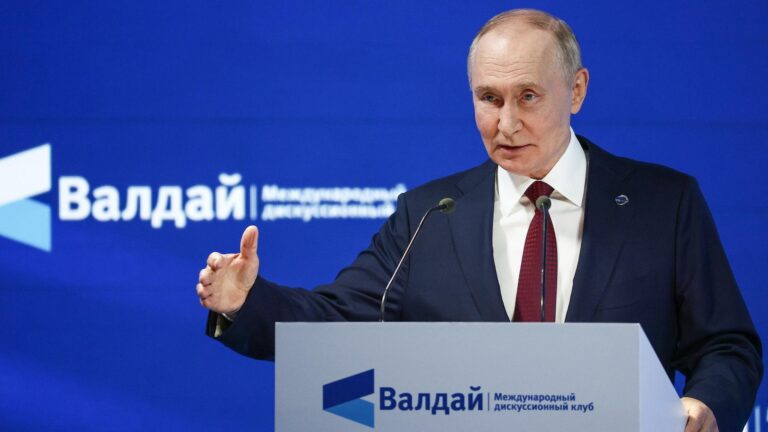Putin’s Perspective on Trump and the Risks of US Long-Range Missile Aid to Ukraine
Putin’s Recognition of Trump’s Diplomatic Approach Amid Rising Global Tensions
In a rare public statement, Russian President Vladimir Putin expressed admiration for former U.S. President Donald Trump’s diplomatic style, describing it as pragmatic and influential during a period of significant geopolitical shifts. Putin noted that Trump’s unpredictable tactics on the world stage prompted a strategic reassessment among global powers, subtly acknowledging the former president’s impact without fully endorsing his policies. This nuanced praise emerges against the backdrop of strained Russia-U.S. relations, reflecting the complexity of their ongoing interactions.
Simultaneously, Putin issued a firm warning regarding the United States’ plans to supply Ukraine with advanced long-range missile systems. He stressed that such military assistance could severely undermine diplomatic ties and exacerbate the conflict. Russian officials highlighted several critical concerns:
- Potential for direct military confrontation: The deployment of long-range missiles near Russian territory might trigger retaliatory actions.
- Threat to regional stability: Introducing these weapons could disrupt fragile ceasefire agreements and heighten volatility in Eastern Europe.
- Negative diplomatic consequences: The move risks reversing recent progress in dialogue and cooperation between Moscow and Washington.
| Factor | Possible Outcome |
|---|---|
| Military Equilibrium | Increased risk of escalation |
| Diplomatic Engagement | Worsening US-Russia relations |
| Regional Security | Heightened instability in Eastern Europe |
Evaluating the Impact of US Long-Range Missile Deliveries to Ukraine
The announcement of the United States providing Ukraine with long-range missile capabilities has sparked a cautious response from Moscow. While Putin acknowledged Trump’s distinctive approach to international affairs, he simultaneously cautioned that such military support could deepen diplomatic rifts and escalate tensions. This development underscores the fragile balance of power in Eastern Europe and the risks associated with introducing advanced weaponry into an active conflict zone.
Military analysts warn that the presence of US long-range missiles in Ukraine could significantly shift the strategic landscape. The extended reach of these weapons may provoke countermeasures from Russia and increase anxiety among its regional allies. The table below summarizes the potential ramifications:
| Dimension | Expected Effect |
|---|---|
| Diplomatic Relations | Marked deterioration and heightened hostility |
| Military Dynamics | Advantage shifts toward Ukraine |
| Regional Stability | Increased unpredictability and tension |
| Global Alliances | Pressure on NATO and allied realignments |
- Expansion of US military aid signals a more assertive American posture in Eastern Europe.
- Russia’s counter-strategy may involve both diplomatic pushback and military adjustments.
- International negotiations risk becoming more polarized and less productive.
Consequences for Russia-US Relations and Eastern European Security
Putin’s statements have intensified the already delicate relationship between Russia and the United States. While acknowledging Trump’s leadership qualities, the Russian president’s caution about the missile transfers to Ukraine signals a potential escalation in diplomatic tensions. Moscow views this military aid not just as support for Ukraine but as a direct challenge to its strategic interests and influence in the region. This stance threatens to stall diplomatic efforts and harden rhetoric on both sides.
The broader security environment in Eastern Europe is also poised for significant changes. Key implications include:
- Heightened militarization: Neighboring nations may increase defense spending and military readiness in response to the arms buildup.
- Elevated risk of conflict escalation: The deployment of long-range missiles could provoke reactive measures from Russia, raising the chances of miscalculations.
- Realignment of alliances: Countries in the region might shift their security partnerships based on evolving threat perceptions.
| Area | Likely Impact | Short-Term Effect |
|---|---|---|
| Diplomatic Relations | Communication breakdown and reduced cooperation | Suspension or delay of negotiations |
| Military Posture | Increased alertness and troop deployments | Additional forces stationed near conflict zones |
| Regional Stability | Greater insecurity and unpredictability | More frequent border incidents |
Strategic Approaches to Mitigate US-Russia Diplomatic Strains
To navigate the escalating tensions surrounding US military aid to Ukraine, policymakers must adopt a balanced approach that combines diplomatic finesse with strategic caution. Maintaining open communication channels is essential to prevent unintended escalations. Recommended strategies include:
- Back-channel negotiations: Engage in confidential talks to identify mutually acceptable compromises away from public scrutiny.
- Transparency initiatives: Implement reciprocal information sharing regarding missile deployments to reduce misunderstandings.
- Leveraging multilateral institutions: Use international organizations to facilitate dialogue, build consensus, and share responsibility.
Simultaneously, the US should carefully modulate its military assistance to Ukraine, balancing the need to support Kyiv with the imperative to avoid further deterioration in US-Russia relations. The table below outlines strategic options and their potential impacts:
| Strategy | Key Advantage | Associated Risk |
|---|---|---|
| Phased arms delivery | Reduces risk of rapid escalation | May limit immediate battlefield effectiveness |
| Joint US-Russia verification missions | Builds mutual trust and transparency | Complex coordination challenges |
| Strengthening NATO deterrence | Reassures allies and deters aggression | Could heighten Russian security concerns |
Final Thoughts
As the conflict in Ukraine continues to dominate international discourse, President Putin’s comments underscore the fragile state of US-Russia relations amid ongoing military support to Kyiv. While recognizing former President Trump’s distinctive leadership, Putin’s caution regarding the provision of long-range missiles highlights the potential for increased diplomatic friction. The global community will be closely monitoring how Washington balances its commitment to Ukraine with the broader implications for international security and its complex relationship with Moscow.







